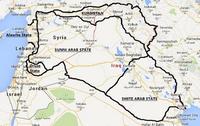-
Identifying ways to improve smartphone security

What information is beaming from your mobile phone over various computer networks this very second without you being aware of it? Experts say your contact lists, e-mail messages, surfed Web pages, browsing histories, usage patterns, online purchase records and even password protected accounts may all be sharing data with intrusive and sometimes malicious applications, and you may have given permission. The apps downloaded to smartphones can potentially track a user’s locations, monitor his or her phone calls and even monitor the messages a user sends and receives — including authentication messages used by online banking and other sites, he says, explaining why unsecured digital data are such a big issue. Assigning risk scores to apps may slow down unwarranted access to personal information.
-
-
ICE offices subscribed to national license-plate database in violation of DHS policy
In February, DHS officials dropped a controversial bidwhich would have allowed the department to access a national license-plate database, citing possible violation of Americans’ civil liberties. Soon after, DHS officials established a policy which required similar plans to be reviewed by department privacy officers. Roughly two months after that policy was put in place, officials with DHS’s Newark and Houston field offices of the Immigration and Customs Enforcement(ICE) agency purchased subscriptions for a commercially run national license-plate database without approval from DHS’ privacy office.
-
-
Lack of federal authority makes fashioning coherent national Ebola policy difficult

Earlier this week, the Centers for Disease Control and Prevention(CDC) issued new guidelines on how states should deal with travelers from Ebola-stricken regions, but a lack of federal authority to mandate such guidelines has led to conflicting strategies, varying from state to state, which includes mandatory at-home quarantine for some travelers. Under current U.S. law, the states have the authority to issue quarantine or isolation policies, and they also control the enforcement of these policies within their territories.
-
-
New report details Russia’s cyber-espionage activities
Researchers at FireEye, a Silicon Valley-based computer security firm, are connecting the Russian government to cyber espionage efforts around the world. The researchers released a report on Tuesday which says that hackers working for the Russian government have, for seven years now, been hacking into computer networks used by the government of Georgia, other Eastern European governments, and some European security organizations.
-
-
Georgia Tech releases 2015 Emerging Cyber Threats Report
In its latest Emerging Cyber Threats Report, Georgia Tech warns about loss of privacy; abuse of trust between users and machines; attacks against the mobile ecosystem; rogue insiders; and the increasing involvement of cyberspace in nation-state conflicts.
-
-
Many victims of Hurricane Sandy are still waiting for government aid

It has been two years since Hurricane Sandy destroyed thousands of homes and businesses along the Jersey Shore yet many affected homeowners are still waiting for federal and state aid to rebuild. Of the $3.26 billion the U.S. Department of Housing and Urban Development (HUD) has provided to New Jersey, only $802 million has been paid out as of 30 September. The federal government’s first allocation of Sandy funds to New Jersey came seven months after the storm. The state has yet to issue any of the $1.46 billion approved by HUD in May, and New Jersey officials expect a final round of $880 million next spring.
-
-
Connecticut and Kansas implement next-gen 911 system
Connecticut and Kansas are both currently installing the next generation of 911 telephone systems (NG911) in different cycles, but both are seeing the added benefits of the evolved system.NG911 will allow both states to offer the services of up-to-the-second multimedia information, including cell phone texts and video, as responders rush to an emergency site.
-
-
Los Angeles mayor says fire response times are too slow
Citing new research and statistics, Los Angeles Mayor Eric Garcetti claimed that previous fire station response times “stunk” and that with a new program in place, the Los Angeles Fire Department (LAFD) would be able to cut those responses considerably. The new FireStat program had revealed that the responses were considerably slower than what former Fire Chief Brian Cummings had been reporting.
-
-
Dzhokhar Tsarnaev’s friend convicted of lying to police investigating Boston Marathon bombing
Robel Phillipos, 21, of Cambridge, Massachusetts, a friend of Boston Marathon bomber Dzhokhar Tsarnaev, was convicted yesterday (Tuesday) of lying to police during the investigation of the 2013 attack. Phillipos was convicted of two counts for lying about being in Tsarnaev’s dorm room three days after the attack, at the same time that two other friends removed a backpack containing fireworks and other related evidence from the room. The three friends went to Tsarnaev’s room while federal and local law enforcement units were engaged in an intense search for the bombing suspects.
-
-
Court orders reinstatement of CBP terminated employee, saying termination was unjustified
Customs and Border Protection(CBP) agent Thomas G. Wrocklage has triumphedin his effort to return to work following a federal appeals court’s disagreement with how the Merit Systems Protection Board(MSPB) decided his removal appeal. Wrocklage disagreed with his supervisors about a $300 fine issued to an elderly couple returning from a trip to Canada for failure to disclose to a second border officer that they had with them some fruits and vegetables.
-
-
Legal framework needed to govern soon-to-arrive autonomous killer drones: Experts
With about 8,000 unmanned aircrafts and roughly 12,000 unmanned ground vehicles, the U.S. military boasts the world’s largest drone arsenal, followed by Israel, with China, Europe, India, and Russia in the second tier. Unmanned aerial vehicles (UAV) will pose a challenge to current international laws of warfare since someday, and sooner rather than later, they will be able to act autonomously – and kill autonomously. The international community has yet to adopt special laws to govern the use of drones in combat.
-
-
Peekaboo, I see you: Government authority intended for terrorism is used for other purposes
The Patriot Act continues to wreak its havoc on civil liberties. Section 213 was included in the Patriot Act over the protests of privacy advocates and granted law enforcement the power to conduct a search while delaying notice to the suspect of the search. Known as a “sneak and peek” warrant, law enforcement was adamant Section 213 was needed to protect against terrorism. But the latest government report detailing the numbers of “sneak and peek” warrants reveals that out of a total of over 11,000 sneak and peek requests, only fifty-one were used for terrorism. Yet again, terrorism concerns appear to be trampling our civil liberties.
-
-
Legality of mandatory quarantine of asymptomatic individuals questioned
Roughly three decades ago, patients in New York were forced into isolationafter an outbreak of tuberculosis, and about seventy years before that, an influenza pandemic led to mass quarantine in major American cities. Today, fear of an Ebola outbreak in the United States has led some states to mandate quarantine of individuals suspected of having the Ebola virus, but legal analysts question the legality of such measures.
-
-
Tunisia’s Islamist party Ennahda concedes defeat in Sunday’s elections
Tunisia’s Islamist Ennahda party, the first Islamist movement to come to power in an Arab country in the wake of the 2011 Arab Spring turmoil, has conceded defeat in Tunisia’s general elections held on Sunday. Ennahda’s main secular rival, the Nidaa Tounes party, is certain to emerge as the strongest force in the new parliament. Unlike the Muslim Brotherhood in Egypt, Ennahda did not try to turn Tunisia into an Islamist state and did not use its parliamentary majority to exclude non-Islamists from power. It opted for a coalition government with two secular parties, and participated in the writing of a new constitution which is regarded as the most progressive in the Arab world. Its mishandling of the economy, and a general anti-Islamist sentiment in Tunisia, doomed its hope of retaining power.
-
-
A framework for destroying ISIS and creating stability in the Middle East

In responding to the barbarism of ISIS, the United States must develop and articulate a political strategy that keeps America out of an inter-ethnic civil war, relies on local Arab armies to defeat ISIS, reduces Iran’s influence in the region, strengthens Israeli security, and prevents terrorist groups like ISIS from ever again establishing a political or geographic foothold in Syria and Iraq. The current U.S. policy of arming the overwhelmingly Shiite Arab Iraqi government army, the Iraqi Kurdish Peshmerga forces, and the hodgepodge Free Syrian Army is not going to achieve these goals. Instead, the United States should pursue a strategy based on diplomatically recognizing the already-existing partition of the region into its natural divisions — the “Five State” partition. The Five State approach aims to re-partition the two failed states of Syria and Iraq into more stable and cohesive states which will exclude Iranian influence, provide a stable and potentially powerful Sunni Arab state that can ally with the pro-Western Sunni Arab states, and accommodate the security concerns of the major regional non-Arab powers, Israel, Turkey, and the concerns of neighboring Russia.
-
More headlines
The long view
Factories First: Winning the Drone War Before It Starts
Wars are won by factories before they are won on the battlefield,Martin C. Feldmann writes, noting that the United States lacks the manufacturing depth for the coming drone age. Rectifying this situation “will take far more than procurement tweaks,” Feldmann writes. “It demands a national-level, wartime-scale industrial mobilization.”
No Nation Is an Island: The Dangers of Modern U.S. Isolationism
The resurgence of isolationist sentiment in American politics is understandable but misguided. While the desire to refocus on domestic renewal is justified, retreating from the world will not bring the security, prosperity, or sovereignty that its proponents promise. On the contrary, it invites instability, diminishes U.S. influence, and erodes the democratic order the U.S. helped forge.
Fragmented by Design: USAID’s Dismantling and the Future of American Foreign Aid
The Trump administration launched an aggressive restructuring of U.S. foreign aid, effectively dismantling the United States Agency for International Development (USAID). The humanitarian and geopolitical fallout of the demise of USAID includes shuttered clinics, destroyed food aid, and China’s growing influence in the global south. This new era of American soft power will determine how, and whether, the U.S. continues to lead in global development.
Water Wars: A Historic Agreement Between Mexico and US Is Ramping Up Border Tension
As climate change drives rising temperatures and changes in rainfall, Mexico and the US are in the middle of a conflict over water, putting an additional strain on their relationship. Partly due to constant droughts, Mexico has struggled to maintain its water deliveries for much of the last 25 years, deliveries to which it is obligated by a 1944 water-sharing agreement between the two countries.
How Disastrous Was the Trump-Putin Meeting?
In Alaska, Trump got played by Putin. Therefore, Steven Pifer writes, the European leaders and Zelensky have to “diplomatically offer suggestions to walk Trump back from a position that he does not appear to understand would be bad for Ukraine, bad for Europe, and bad for American interests. And they have to do so without setting off an explosion that could disrupt U.S.-Ukrainian and U.S.-European relations—all to the delight of Putin and the Kremlin.”
How Male Grievance Fuels Radicalization and Extremist Violence
Social extremism is evolving in reach and form. While traditional racial supremacy ideologies remain, contemporary movements are now often fueled by something more personal and emotionally resonant: male grievance.
